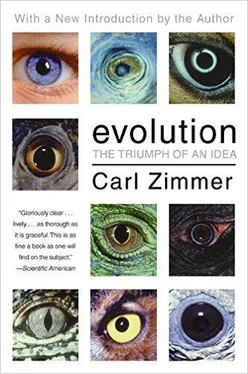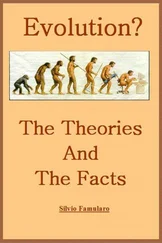From fossils to genes, the past five years have buried us under a fresh avalanche of evidence that we share a common ancestor with apes—that we are the product of evolution like all other organisms on Earth. But this news apparently has not reached D. Chris Buttars, a state senator in Utah. In 2005, Buttars wrote an opinion piece in USA Today in which he declared, “The theory of evolution, which states that man evolved from some other species, has more holes in it than a crocheted bathtub.”
Despite all the new fossils of hominids scientists have described in the past five years—not to mention thousands of other hominid fossils discovered in earlier decades—Buttars flatly stated that “there has not been any scientific fossil evidence linking apes to man.” He did not even bother to mention all the evidence of human evolution stored in DNA. Apparently that was not even worth rejecting.
Buttars came to national attention in 2005 when he launched a campaign to change the way public schools in Utah teach biology. He did not want teachers to present evolution as the only plausible scientific explanation for the diversity of life today. He wanted students to learn as well about something he called “divine design.”
Buttars hasn’t been very clear about what he means by this phrase. According to the Salt Lake Tribune, Buttars “believes God is the creator, but His creations have evolved within their own species.”
“We get different types of dogs and different types of cats, but you have never seen a ‘dat,’ ” Buttars said to the newspaper.
Dats notwithstanding, it’s not too hard to figure out what Buttars has in mind. In Evolution: The Triumph of An Idea, I described how in the 1980s creationists were stung by a string of defeats in the courts. Judges recognized that “creation science” was actually religion and therefore had no place in classrooms. Some creationists set out to repackage many of their old arguments, leaving out explicit mentions of religion, and gave them a new name: intelligent design. In 1989, intelligent design advocates published a book, Of Pandas and People, which they promoted as a textbook for ninth-grade students. Organizations such as the Discovery Institute of Seattle began claiming that intelligent design was a viable alternative to evolution.
In 1999 conservative members of the state board of Kansas took the message seriously and decided to draft changes to the state education standards. The changes would have introduced doubt and uncertainty about evolution. In some cases it simply stripped it out of the standards altogether—along with discussions of the age of the Earth and the Big Bang. Their proposals drew international attention, which may have led to the defeat of several creationist-allied members in 2000.
The story did not end there, however. In the next round of elections the balance of the board shifted back, and the push moved forward again. In October 2005, the Kansas Board of Education finally passed their new education standards. The changes actually extended far beyond evolution, to redefine science itself. Previously, the Kansas standards held that “science is the human activity of seeking natural explanations for what we observe in the world around us”—a definition that’s supported by every major organization of scientists. But the new standards no longer limit science to the natural. The school board redefined it as “a systematic method of continuing investigation that uses observation, hypothesis testing, measurement, experimentation, logical argument, and theory building to lead to more adequate explanations of natural phenomena.” Supernatural explanations of the world have a place in science—at least in Kansas.
Over the past five years other states have seen renewed attempts to stop or at least undermine the teaching of evolution in public schools. And in October 2004, a rural school district in Dover, Pennsylvania, went one step further and began to promote intelligent design. The local school board added a new statement to their science curriculum: “Students will be made aware of gaps/problems in Darwin’s theory and of other theories of evolution including, but not limited to, intelligent design.”
The board of education also demanded the teachers read a second statement aloud to all Dover biology classes. The teachers were required to say that evolution was a theory, not a fact—confusing the nature of both facts and theories. “Intelligent design is an explanation of the origin of life that differs from Darwin’s view,” the statement continued. “The reference book Of Pandas and People is available for students to see if they would like to explore this view in an effort to gain an understanding of what intelligent design actually involves. As is true with any theory, students are encouraged to keep an open mind.”
The Dover science teachers were appalled and refused to read the statement. Administrators had to step in. When students asked what sort of designer was behind intelligent design, the administrators told them to ask their parents.
Two months later, eleven parents in the Dover area school district filed a lawsuit, arguing that this statement violated the First Amendment because it represented the impermissible establishment of religion. The board of education countered that they had nothing of the sort in mind. “All the Dover school board did was allow students to get a glimpse of a controversy that is really boiling over in the scientific community,” declared Richard Thompson, the chief counsel for the school district.
A few inconvenient facts emerged over the next few weeks, however. Thompson is the president of the Thomas More Law Center in Michigan, which describes itself as “dedicated to the defense and promotion of the religious freedom of Christians, time-honored family values, and the sanctity of human life.” As early as 2000, lawyers from the Thomas More Law Center had visited school boards around the country to find one that would teach Of Pandas and People in their science classes. As the New York Times reported in November 2005, the lawyers promised that if a board was sued, they would defend it at no cost. In West Virginia, Minnesota, and Michigan, the lawyers were turned down. But in Dover they had better luck. Witnesses at the trial testified how Dover school board members began talking about how they would introduce intelligent design into science classes “to bring prayer and faith back into the school.”
The trial put to rest any doubts about the origins of intelligent design, thanks to the testimony of Barbara Forrest, a philosopher of science at Southeastern Louisiana University. Forrest compared a draft of Of Pandas and People to the final version. She showed how the authors had used terms like creationism or creation science one hundred fifty times in the draft, and then transformed them all into intelligent design.
The trial proved to be a devastating blow for creationists. Shortly after it ended—and before Judge John E. Jones III had issued his decision—the people of Dover voted out the intelligent design-friendly members of the school board. They were replaced by candidates who had promised to take creationism out of the schools. Seven weeks later, on December 20,2005, Judge Jones delivered a blistering defeat to the entire intelligent design movement.
“We conclude that the religious nature of I.D. would be readily apparent to an objective observer, adult or child,” he wrote. On all levels, he ruled, intelligent design failed as a science.
Richard Thompson may have claimed that students should be told about “a controversy that is really boiling over in the scientific community,” but in fact no such scientific controversy exists. In an actual scientific controversy, both sides publish a string of papers in peer-reviewed journals presenting new evidence from experiments and observations. In an actual scientific controversy, scientists go to major conferences and present their results to their peers, who can challenge their data face-to-face. There’s no shortage of scientific controversies that meet this standard, from debates about the architecture of thought to battles over the causes of cancer.
Читать дальше












